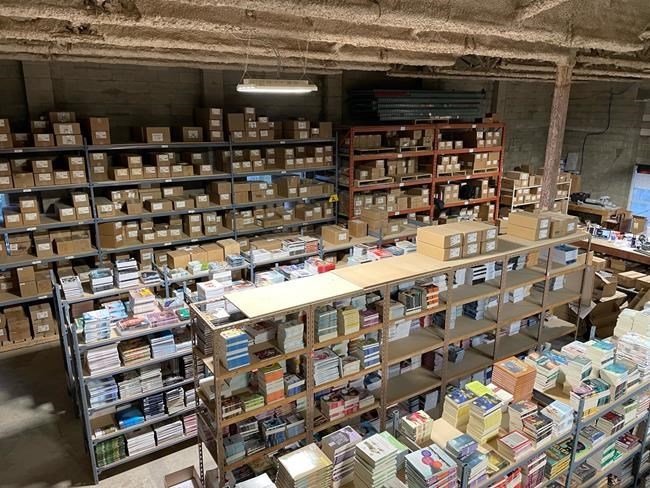TORONTO — As COVID-19 restrictions shuttered bookstores across the country last year, Dundurn Press president and publisher Scott Fraser says he feared the crisis would deliver a death blow to one of Canada's largest independent publishing houses.
But since then, Fraser says the Toronto press's sales have rebounded as many Canadians appear to have emerged from lockdown with a renewed love of reading.
Now, however, industry watchers say Canada's literary sector faces a new threat that has publishers and booksellers worried about selling out of top titles during the all-important holiday sales season: supply chain disruptions.
"Going back 12-18 months, and I think I'm probably not the only person who will look back in this way, it wasn't obvious that the company was going to make it," said Fraser.
"Now that we're coming out … to have this issue of supply management supersede our efforts to actually get to market and promote and sell these books is a major, major inconvenience, to put it lightly."
While supply chain issues wreak havoc across the global economy, the squeeze poses particular perils to the slow-moving, mercurial and increasingly conglomerated Canadian book industry, say stakeholders and analysts.
"This really is the perfect storm for supply chain concerns," said Kate Edwards, executive director at the Association of Canadian Publishers. "These disruptions are affecting the industry across the board."
The trouble starts with a worldwide paper shortage, which alongside surging demand for adhesives and ink, has made the book production process more expensive and more complicated, said Edwards.
The scarcity of raw materials has, in turn, jammed up book printers, she said, leaving publishers jockeying for press time at premium prices.
Edwards said the obstacles stack up further on the distribution side as shortages of workers, shipping containers and storage space cause delivery delays.
The turmoil comes just as the Canadian book industry seemed poised for a turnaround, sales data suggest.
BookNet Canada, an agency that tracks publishing trends, reported that national print sales amounted to nearly $464 million in the first six months of 2021, an increase of about 11 per cent, or $47 million, compared to the same period in 2020.
These gains put the market on track to return to nearly pre-pandemic levels. But this momentum could be undermined by supply chain issues at a peak time of year for book purchases, said Steven Beattie, a literary critic and writer.
The months leading up to the holidays are when book businesses make a sizable share of their profits, as fall literary awards and the spirit of giving drive up interest in reading, said Beattie, who covers the publishing industry on his blog, the Shakespearean Rag.
Beattie said the concern is that publishers and retailers won't be able to keep up with demand for the titles at the top of readers' wish lists, culminating in a "backlist Christmas" — an industry term for books that have been in print for more than a year.
"There's a lot of very tricky back-and-forth going on between the booksellers, the distributors and the publishers to try to figure out what's the optimum stock level to order at this point to ensure that we have enough, but not too much."
Of particular concern, said Beattie, are so-called "black swan" titles — books that aren't expected to be blockbusters, but propelled by the whims of literary buzz, shoot up the bestsellers list.
Fraser said Dundurn Press faced the double-edged sword of surprise success when "The Son of the House" by Cheluchi Onyemelukwe-Onuobia was shortlisted for the Scotiabank Giller Prize last month.
Normally, the publishing house would reprint the book in one large run at a single company for a bulk discount, said Fraser. But with many major printers booked up, the press settled for smaller runs from at least four different vendors at a higher cost per unit.
It's also become harder to anticipate the size of initial print runs as consolidation in the book industry has given major retailers more leeway to place orders closer to publication, said Fraser.
In some cases, this has put Dundurn Press in the unfortunate position of playing catch-up just as a new release is taking off, he said, noting that one book sold out of stock on Amazon before even hitting shelves.
For authors, he said, the missed opportunities can be devastating.
"It is a major, major source of anxiety, because they don't get paid if the books don't sell."
Chris Hall, president of the Canadian Independent Booksellers Association, said many sellers decided to stock up early this year rather than risk running out of the must-read of the season.
The co-owner of McNally Robinson, which has locations in Winnipeg and Saskatoon, said about six weeks out from Christmas Day, the bookseller's worst fears hadn't materialized. Stores are even busier than usual, Hall said, and he remains on "high alert" for stock shortages.
While Hall said independent bookstores can't match the buying power of big-box retailers, they do have another kind of competitive advantage — relationships with their customers.
He urged book-buyers to shop early if they have their heart set on a specific title. But even if your first choice is sold out, Hall said, staff at your local bookstore will be happy to provide a recommendation.
"We are going to have a store full of good books right through the Christmas season," he said. "There'll just be some titles that may not be available."
However, Edwards of the Association of Canadian Publishers warned that book supply chain woes look to be a challenge well beyond the holiday season.
Many of these problems predate the pandemic, she noted, and the industry needs to be adaptive as the literary landscape continues to shift.
"This isn't going to be resolved in 2022, maybe even 2023," said Edwards. "Everyone needs to be nimble and strategic and be able to respond to the unexpected."
This report by The Canadian Press was first published Nov. 18, 2021.
Adina Bresge, The Canadian Press



